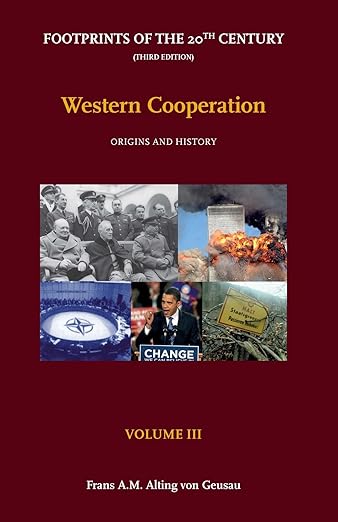NOTIFICATION TO READERS: Contact: Email: geusau@gmail.com This website is now restored (March 8, 2024) after several years following closure and disappearence of WLP Publisher Documents referred to in the five volumes "Footprints of the twentieth century" are restored on this website. News and ER Subject contain comments on current affaits *** FOOTPRINTS OF THE TWENTIETH CENTURY
"To learn from history in an era in which various ideologies of progress disown history or rewrite it to serve their political aims. The fight of memory against organized forgetting is part ofn the perennial fight of us human beings against abuse of power and political violence."
Such has been my purpose in writing the five books under this title, as professor emeritus.
The 5 volumes in the series "Footprints of the Twentieth Century" were completed between 2009 and 2014. The books were published separately at different times. Under the headings: News and European News (under European Union), I comment on recent events, adding interesting articles from other sources.
Including recent updates in volumes three and four, and a new chapter 10 in volume five, the five volumes have now been published together on September, 1st. 2017 as the third edition of the series.
The series deals with aspects of the American Era in world politics, opened by President Woodrow Wilson in January 1917 and closed by President Trump's America First in January 2017.
Central to the series is its third volume on Western Cooperation. For the study of international relations, knowledge of the history of Western Cooperation in the Twentieth Century is essential. The third volume reviews the broader history from America's entry in the First World War to the inauguration of President Obama in 2009 and in Chapter 7 of the second part to the inauguration of President Trump. I present the history of Western Cooperation around a central theme: the effort of realist idealists to replace power politics by closer, multilateral cooperation between democracies. America's entry in 1917 coincided with the Russian revolution that brought Lenin to power: the totalitarian threat to the world followed by the confrontation between the United States and the Soviet Union until 1991. The first two volumes in this series focus on two important themes in the confrontation: "Cultural Diplomacy: waging war by other means?" in volume 1, and "The Illusions of |Détente" in Volume 2.
The peaceful collapse of the Soviet totalitarian, communist system has been a watershed of historic proportions in Europe and the world. In 1989, unexpectedly, Communism and the Cold War were behind us, they were bad and should be forgotten. The immediate post-1989 world presented itself as a new era of organised forgetting, as neither East nor West were interested in examining the prolonged period of acquiescence in absurdities.
The Berlin Wall, paramount symbol of absurdity, had to be erased from the face of the earth and the memory of the people. Only much later have we become aware how much the heritage of repression and division still dominates our thinking. The principal organisations of Western and European cooperation have been enlarged Eastward, but the fruits of peaceful, spiritual revolution have turned sour. Far too little has changed for the better and far too many old habits have survived.
For the question asked in this volume: Is bilateral cultural diplomacy waging war with other means? There still is no good answer. The surprise of 1989 has apparently paralyzed policies thereafter. Despite resounding declarations and non-binding resolutions on a new order, there was no vision, no strategy and no clear purpose. The basic approach was “more of the same”. Cultural diplomacy had no priority and budgets were cut in Germany, the United Kingdom and the United States.
Since 1989, as I write in the second volume, we refer to the whole post-war period as the “Cold War Era”. Such was not the case in 1968. At the time, the cold war – in our perception – was behind us. We no longer felt to be in the midst of it. Europeans on the Western side of the Iron Curtain felt relatively at ease with Europe’s division. The era of Détente as we called it, was considered to be a fairly stable and long-lasting political condition, even after Soviet tanks crushed Dubcek’s socialism with a human face in Prague.
A strange year it was… 1968. Academic interest was focused on the war in Vietnam, nonproliferation of nuclear weapons, the French Gaullist challenge to the European Communities and the student revolt in Paris. The Western democracies promoted the process of détente on the basis of three political illusions. They assumed that common institutions between East and West would generate a sense of common interest in European security, facilitating negotiated solutions of outstanding problems. They expected East-West economic cooperation to promote reform from above in the East, towards more open societies. They hoped to foster democracy and respect for human rights through cooperation in the cultural and human dimension. By 1989 all three of them had proven to be illusions. The end of the Soviet system came as a complete surprise to most politicians and to all Western advocates of détente in the Nineteen Eighties. The so-called dissidents won a peaceful victory over the one-party, repressive regimes in the East and helped to end the post-war division of Europe. Obviously, neither the (now former) communists nor the advocats of detente ever admitted their wrong. So they went all into the business of proclaiming a new era as a continuation of the old one.The greatest catastrophe of the Twentieth Century was Lenin`s creation of totalitarian Soviet Russia at the end of the Great War and not its collapse at the end of the Cold War, as president Putin said in 2005. In this volume I particularly challenge the past illusions of détente and the present approach of organized forgetting the past.
The last two volumes deal, in a way, with the impact of America in world politics. European Unification was made possible by Western Cooperation and is the subject of the Fourth Volume: " European Unification into the Twenty First Century." The story of European Unification is fascinating. In 1950, two sworn enemies – France and Germany – decide to seek reconciliation and European federal unity. As a first step, they created the European Coal and Steel Community together with Italy and the Benelux countries. The fathers of this new Europe were visionary persons. Does today`s student or scholar still know who Robert Schuman, Konrad Adenauer, Alcide de Gasperi or Willem Beyen were and what they stood for?
At the time the United Kingdom refused the invitation to join such a federal project. Under American pressure they asked for admission in 1961, entered in 1973 without ever accepting the federal project and decided to leave in March 2017 after a small majority voted for Brexit in June 2016. In France, Charles de Gaulle and his Fifth Republic came after Robert Schuman and the Fourth Republic. France ever since prefers a Union with intergovernmental Summits over a Community with federal institutions. Germany re-unified in 1990 after the successful peaceful revolution against totalitarian, communist rule in Poland, Hungary and Czechoslovakia. What began as a process of reconciliation between two enemies became a peaceful enlargement of the European Union to twenty seven Member States. The division of Europe between a Soviet dominated East and a Euro-Atlantic West is no more.
This book not only tells a success story. It also makes us understand why after more than sixty years the Germans lack the solidarity and the French the political vision to turn the Euro-crisis into true progress towards unity. Against the background of Europe`s long and turbulent history, this book may also help to understand why it is so difficult to overcome nationalism and to practice the virtue of solidarity so central to the Christian source of Europe as a civilization.
In the fifth and last Volume: "Neither Justice nor Order." I offer some Reflections on the State of the Law of Nations after the end of the American era. This fifth and last volume offers a critical assessment of the state of the law of nations. In the twenty first century the world needs true global law anchored in the dignity of the human person rather than weak international law built on the interests of major sovereign states. One hundred years after the outbreak of the Great or First World War in 1914 and twenty five years after the peaceful end of the Cold War in 1989, little appears to have been learnt from the scale of disasters that befell the world between the assassination in Sarajevo in 1914 and the annexation of Sebastopol in 2014.
The failure to learn from history largely comes from unconverted political leaders and ideologies of progress. The birth of modern international law, assumed to have taken place in 1648, was no moment of progress, nor was the Congress of Vienna in 1815. The peace of Westphalia reduced the law of nations to interstate law. Vienna legitimized the concept of demarcated linear boundaries. Decisions on war and peace needed no deeper justification than raison d'état as stated by the sovereign. Law-making was reserved to a few major powers. The so-called principle of the balance of power concealed policies of aggrandizement and domination. The leaders of all five major powers in Europe are to be held responsible for the outbreak of war in 1914. The entry into force of the Statute of the International Criminal Court in 2002 might be a first step towards international criminal justice for all and not just for the losers.
Nicknamed the ‘international community’ major sovereign powers offer a dismal record on dealing with such issues as human rights, the use of force, the abolition of nuclear weapons and peace in the Middle-East. Human right policies are still to be oriented to the common good, as understood in the Universal Declaration, rather than to blaming other countries. Nuclear weapons can be abolished only by good example. Peace in the Middle-East cannot be found on the dead end road of a two-state solution.
Throughout the book one finds lightening examples of persons who, by their courage and dedication, could make the difference. Among them are Henri Dunant, Ruth Klüger, Andrei Sacharov, Nelson Mandela and Pope John-Paul II. Justice and order need a transition from international law to global law to be realized.
Documents referred to in the third, fourth and fifth volumes, can be found on this website. My website offers a wealth of fascinating documents, some of them not easy to find elsewhere.The website also has a News sector for international items and a European News sector within the one on the European Union.
Under Global Law one can find the full text of my book: "European Perspectives on World Order", published in 1975.





